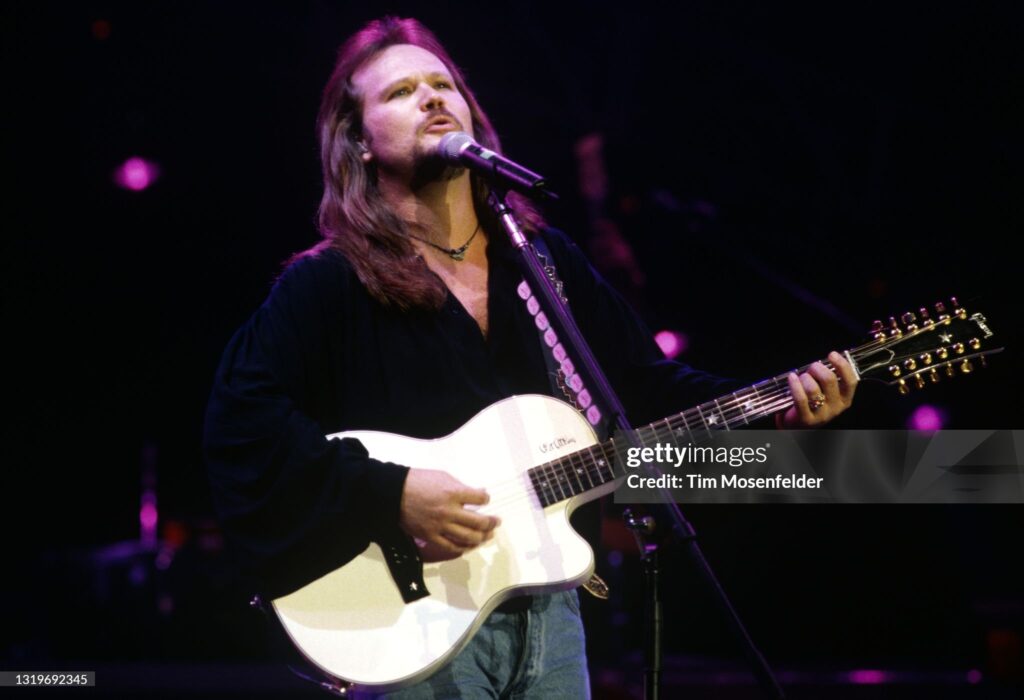
A prayer whispered after the sirens—holding on to love when the night won’t give it back.
Start with the anchors, so memory has a handrail. “Tell Me I Was Dreaming” arrived as a single on April 3, 1995, the final release from Travis Tritt’s double-platinum 1994 album Ten Feet Tall and Bulletproof. Co-written by Tritt with Bruce Ray Brown and produced by Gregg Brown, the song climbed to No. 2 on Billboard’s Hot Country Singles & Tracks and No. 3 in Canada; on the industry airplay list Radio & Records it reached No. 1 for one week (June 30, 1995). The single edit runs 4:53; the album cut stretches to 6:28, letting the story breathe.
On record, the performance is built like a steadying arm. Tritt sings close to the mic—vowels rounded, consonants softened—while the band holds a walking tempo that refuses melodrama. The players credited on Ten Feet Tall and Bulletproof tell you why the track feels so human: Paul Franklin’s pedal steel draws grief in long, merciful lines; Billy Livsey’s Hammond organ warms the edges; Jack Holder’s guitar phrases answer the vocal without crowding it; Sam Bacco’s timpani adds that almost cinematic thrum you feel more than you hear. Nothing is ornamental. Everything is useful to the lyric’s hard wish—that the worst thing that just happened might somehow be a dream.
For many, the song is fused to its music video, the second chapter in Tritt’s “Mac Singleton” mini-movie trilogy about a disabled veteran. Directed by Michael Merriman, this 1995 clip picks up years after “Anymore.” Mac’s pregnant wife, Annie, slips on a dock and falls; the day ends with a newborn daughter in his arms and a life permanently changed. It’s one of the decade’s most wrenching country videos, and it shaped how people heard the single—quiet verses as denial, the chorus as a plea. The story would later find a tender coda in 1998 with “If I Lost You,” which reunites us with Mac and his little girl.
Older ears recognize what the record is really about: not shock, but aftershock. Tritt doesn’t try to out-sing the hurt. He gives you the stubborn ritual grief requires—tell me it wasn’t real, tell me I can go back, tell me I can wake up different—until the heart finally accepts the weight it must carry. That’s why the arrangement stays grounded: drums that keep their dignity, steel that sighs rather than sobs, harmony voices (Dennis Locorriere, Dana McVicker) that arrive like company instead of a crowd. The record understands that grown-up sorrow has its own quiet manners.
There’s also the simple craft of the writing. Tritt and Bruce Ray Brown make plain speech do noble work: a title that sounds like something you’d say at the kitchen table after the phone call, a melody that rises just enough on “tell me” to feel like pleading and then settles back into the truth. Critics heard it, too—Billboard’s Deborah Evans Price praised the “impassioned vocal” and the production’s sharp, country heart. And country radio responded because the record never confuses volume with feeling; it trusts the listener to meet it halfway.
As a career marker, the single stitches together two Travis Tritt strengths. On one side you have the stage animal—the southern-rock bite that made his roadhouse cuts roar. On the other you have the balladeer who can say the hardest things plainly and keep your respect. Ten Feet Tall and Bulletproof is the place those halves meet, and “Tell Me I Was Dreaming” is its quiet pinnacle—a big radio hit that behaves like a private conversation.
Play it now and notice the small choices that make it honest. The organ pads the corners like lamplight. The steel hangs a note a fraction longer than comfort, then lets it go. Tritt leaves a thread of air after the title phrase—as if the wish might still be granted in the split second before the next bar lands. And when the chorus returns, it doesn’t try to top itself; it endures, the way people do when they’re suddenly living with a new, immovable fact.
The video’s heartbreak tends to dominate the memory, but the record alone is enough to carry you through that long night. “Tell Me I Was Dreaming” doesn’t promise miracles. It offers something truer to life: a voice that will stand there with you while the world rearranges itself—no pulpits, no fireworks, just the grace of a song that knows how to hold still. That’s why it lives on, long after the charts and the credits: a country ballad that turns denial into a prayer, and a prayer into the first small step toward morning.